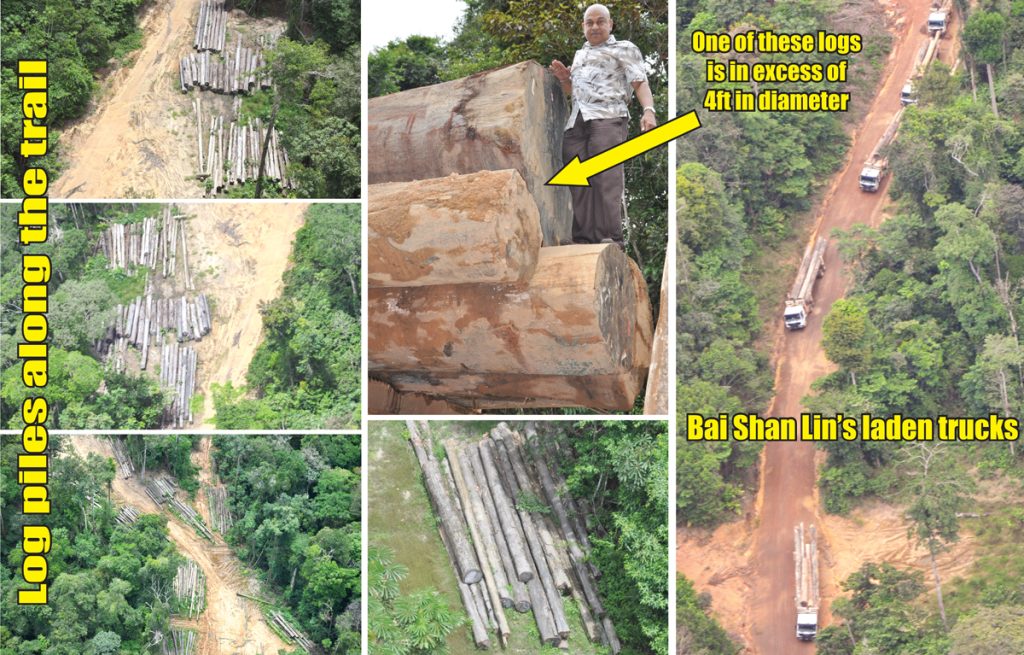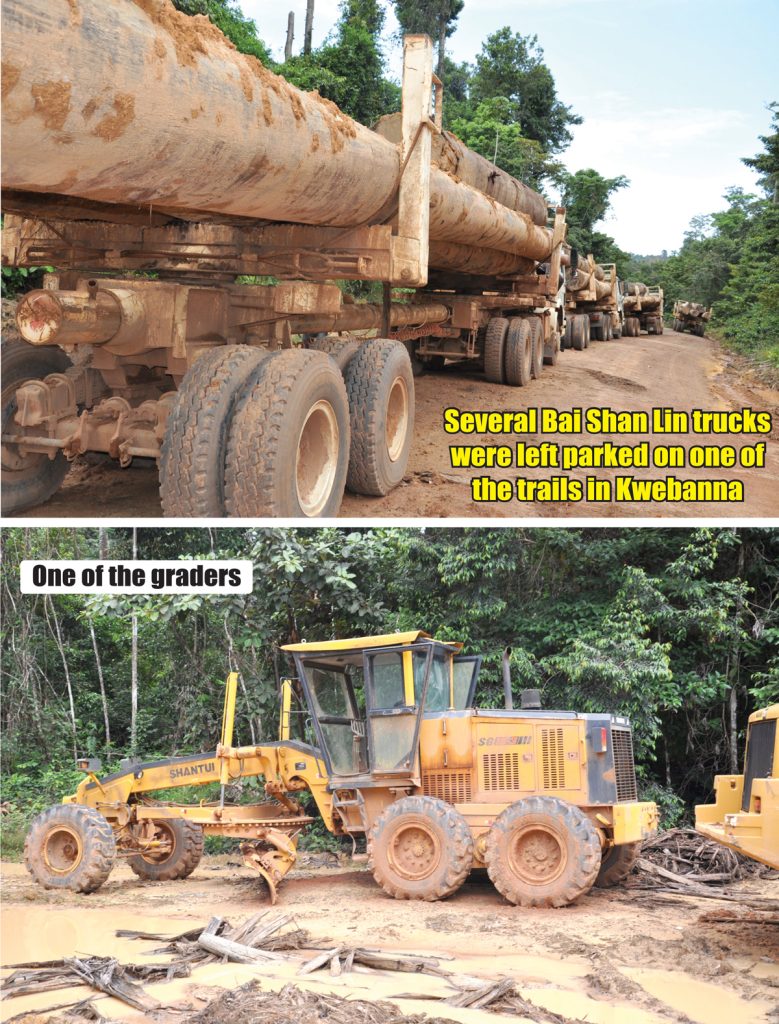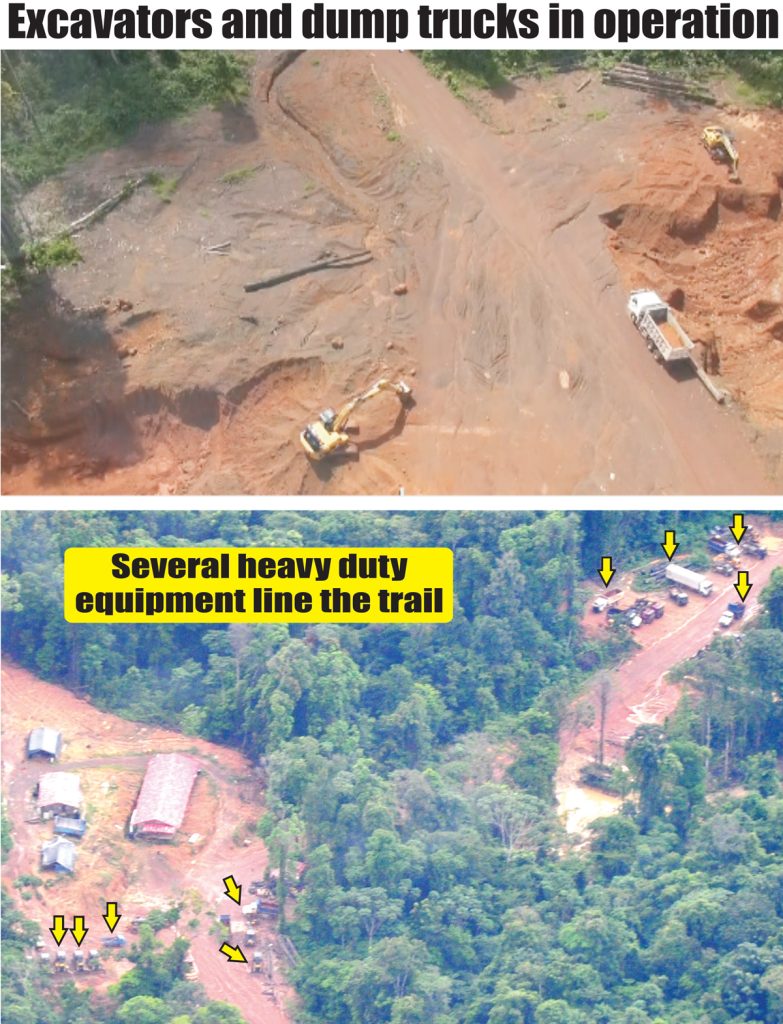… but busy cutting new roads to Waini River
Chinese company, Bai Shan Lin’s operations in Kwakwani, Upper Berbice River, may have evoked widespread public
anger and disbelief over the magnitude, but there are indications now that those operations pale in comparison to what is happening in the Kwebanna, Waini area in Region One, Essequibo.

Kaieteur News, as part of its investigations into the scope of the company’s operations, flew into Region One (Barima/Waini) this week and found that the company has halted its logging operations there in the face of increasing scrutiny of its Upper Berbice operations.
The extent of the Essequibo activities reveals that the scope of logging operations by the company is way larger than Guyanese were initially led to believe.
For several days now, several trucks, laden with massive logs have been sitting on the roadside in the dense jungle in the Kwebanna area. The logs, seen by Kaieteur News, have already been certified with stamps and seals of the Guyana Forestry Commission (GFC).
In Essequibo, the company has been logging various species of wood and selling what it is not exporting to Barama Company Limited, an establishment which has an operation based along the Essequibo River.
Bai Shan Lin has also cut miles upon miles of road leading to the Waini River, and is looking to go even further.
There was a huge fleet of heavy-duty vehicles – some 35 bulldozers, 10 excavators, loaders and about 40 dump trucks – present on several sections of the road being built. Equipment was also present at various locations near loam pits, working to extract material for the road.
At several locations along the winding road, massive logs were seemingly left abandoned. This mimicked the state of play in Region Ten near the communities of Kwakwani, Ituni and Linden, in Region 10, where logs were strategically left waiting for pickup.

It is unclear why the company has stalled operations in Region One. At one location, several trucks were parked next to each other, but no one was in sight. Among the prized species of logs left unattended were some measuring as much as four feet in diameter and more than 70 feet in length. Included among them in great number was the high-valued Purpleheart.
It is clear that Bai Shan Lin is serious about its investments as evidenced by the scores of vehicles and other heavy equipment in the area.
Following investigations and reports by Kaieteur News over the past week on Bai Shan Lin’s operations, the GFC, headed by Commissioner James Singh, and its governing authority, the Ministry of Natural Resources and the Environment, led by Minister Robert Persaud, have launched an aggressive public relations campaign to defend the company.
Already, questions are being raised as to why state agencies would push badly needed resources, to the tune of hundreds of thousands of dollars already, into defending what essentially is a private company, more so a foreign one.
Opposition Parliamentary parties have already accused senior government officials of colluding with the company to hide the true nature of its operations, and taking kickbacks which have caused them to shut up in the face of what could be glaring violations of Guyanese law.

Bai Shan Lin has been boasting of having access to close to a million hectares of rainforest in Guyana as part of its mega investment plans. But Minister Persaud had said that the information was false and called on Bai Shan Lin to retract its claims. The company never did and Persaud never demanded that it did.
On July 14, Persaud told the Parliamentary Sectoral Committee on Natural Resources that the company only has access to 640,000 hectares of forest, with the majority being for various studies.
Regarding forests to which the company has access, Commissioner of Forests, James Singh, said that Bai Shan Lin has two state forest permits. He said such permits are issued for a period of three years, and during that time the company has to do an Environmental and Social Impact Assessment, along with a forest inventory. In addition, Singh said the company has to develop a business plan.
Singh said that it is only if these documents receive a favourable review by the Forestry Commission’s Board, that the company can be issued with a Timber Sales Agreement (TSA) that would allow it to extract trees. The two state forest permits encompass three proposed forestry concession sites.
Apart from this, the company was said to be involved in joint ventures with four local companies through which it has access to some 280,000 hectares of forest from which it can harvest timber for export. Those joint ventures are with Sherwood Forests, Haimorakabra Logging, Puruni Woods, and Kwebanna Wood Products.
The logging activities of Bai Shan Lin would take on extreme significance because of the fact that company has not yet moved into its promised value-added processing phase.
Guyana has actively been pursuing a reduction of log exports in favour of value-added operations, which would give the country more revenue and also provide more job opportunities for Guyanese. However, figures provided have shown a major increase in log exports, especially for the first half of this year. And the increase is being blamed on the aggressive logging activities of Bai Shan Lin and other foreign operators.